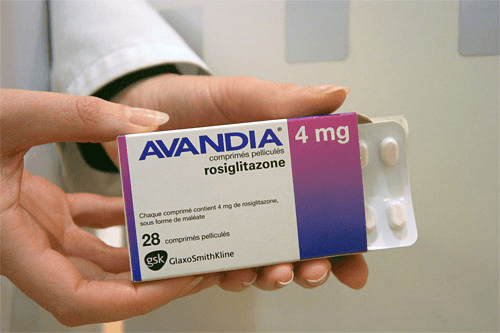Avandia


Avandia, also known as rosiglitazone, is a type 2 diabetes medication that is only available by prescription. It functions by increasing the body's sensitivity to insulin, aiding in blood sugar regulation.
Avandia belongs to the thiazolidinediones drug class, along with pioglitazone (Actos brand name).
It has been demonstrated that Avandia works well to lower blood sugar levels in people with type 2 diabetes. Additionally, Avandia may facilitate:
- Lower the chance of a heart attack
- Lower the chance of a stroke
- Slow the spread of kidney disease
- Lower blood lipid levels (such as triglycerides and cholesterol)
Avandia may result in side effects, just like all medications. The most typical side effects are as follows:
- Migraine
- An upper respiratory tract infection, such as the flu or a cold
the sinusitis
digestive illness
- Muscle aches
- Back ache
Less frequent but more severe side effects include:
- Liver harm
- Heart disease
- Retention of fluid
Loss of bones
Everyone should not take Avandia. People with type 1 diabetes and those who have heart issues shouldn't use it. Avandia might not be appropriate for women who are nursing or pregnant, either.
Talk to your doctor about all of your risks and options if you're thinking about taking Avandia.
The dosages of Avandia are as follows:
- 2 mg and 4 mg tablets
- 8 mg/mL for oral suspension
It's best to take Avandia with food. 4 mg once daily is the typical starting dose. If more is required, your doctor may increase your dose.
Avandia should be taken as soon as you remember if you miss a dose. Skip the missed dose and carry on with your regular schedule if it is almost time for your next dose. Avandia shouldn't be taken in two doses at once.
If you take any other medications, herbs, or vitamins, Avandia may interact with them. Before beginning Avandia, be sure to discuss all of your options with your healthcare provider.
Avandia may interact with a number of medications, including:
I. Insulin
- Warfarin, also known as Coumadin
– Steroids
- Pills for birth control
Increasing the body's sensitivity to insulin is how Avandia functions. This aids in maintaining stable blood sugar levels.
The gastrointestinal tract quickly and completely absorbs Avandia. Within one to two hours, peak plasma concentrations are reached. Avandia has a half-life of 2-4 hours.
There are numerous additional options for treating type 2 diabetes. Drugs in the same class as Avandia include some of the following:
Pioglitazone, marketed under the brand name Actos
- Metformin drug Glucophage
Sitagliptin, sold under the brand name Januvia
-Tradjenta, also known as linagliptin
Numerous other lifestyle modifications can also aid in blood sugar regulation, including:
- Consuming a wholesome diet
- Regular physical activity
- Keeping a healthy weight.
Talk to your doctor about all of your risks and options if you're thinking about finding Avandia alternatives.
Several clinical trials were conducted to assess Avandia's efficacy. Avandia significantly reduced the risk of heart attacks in a study involving 1,352 people with type 2 diabetes compared to those who did not take the medication.
Avandia significantly slowed the progression of kidney disease in a different trial involving 4,447 individuals with type 2 diabetes and a history of heart disease.
The safety and effectiveness of Avandia in people with type 2 diabetes are being examined in a number of ongoing clinical trials.
Seek immediate medical attention if you believe you or someone else may have taken too much Avandia. Overdose symptoms could include:
- Extreme sleepiness
- Perplexity
– Coma
Don't hesitate to ask your doctor any questions you may have about Avandia.








Plus get the inside scoop on our latest content and updates in our monthly newsletter.